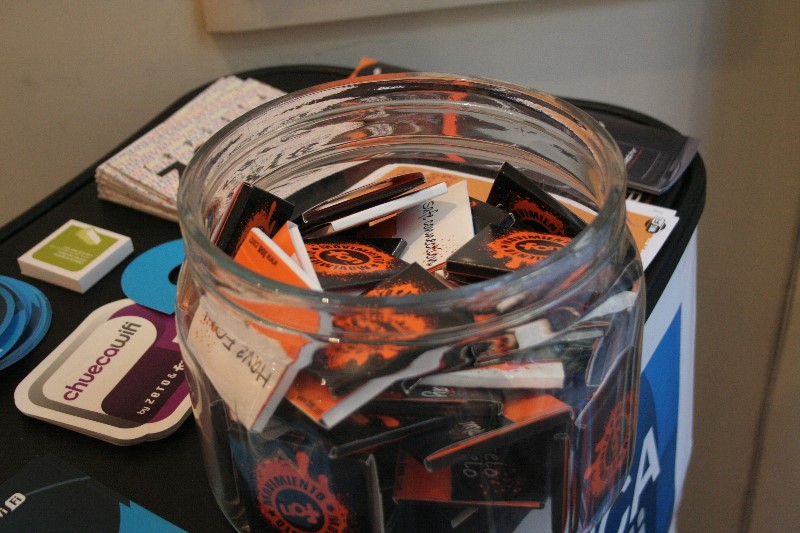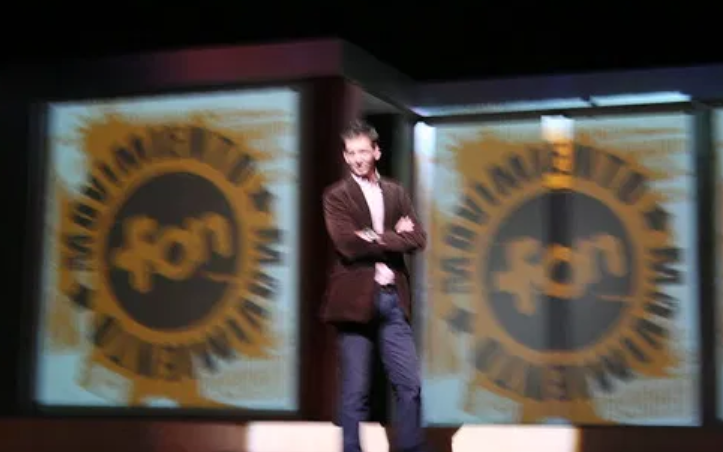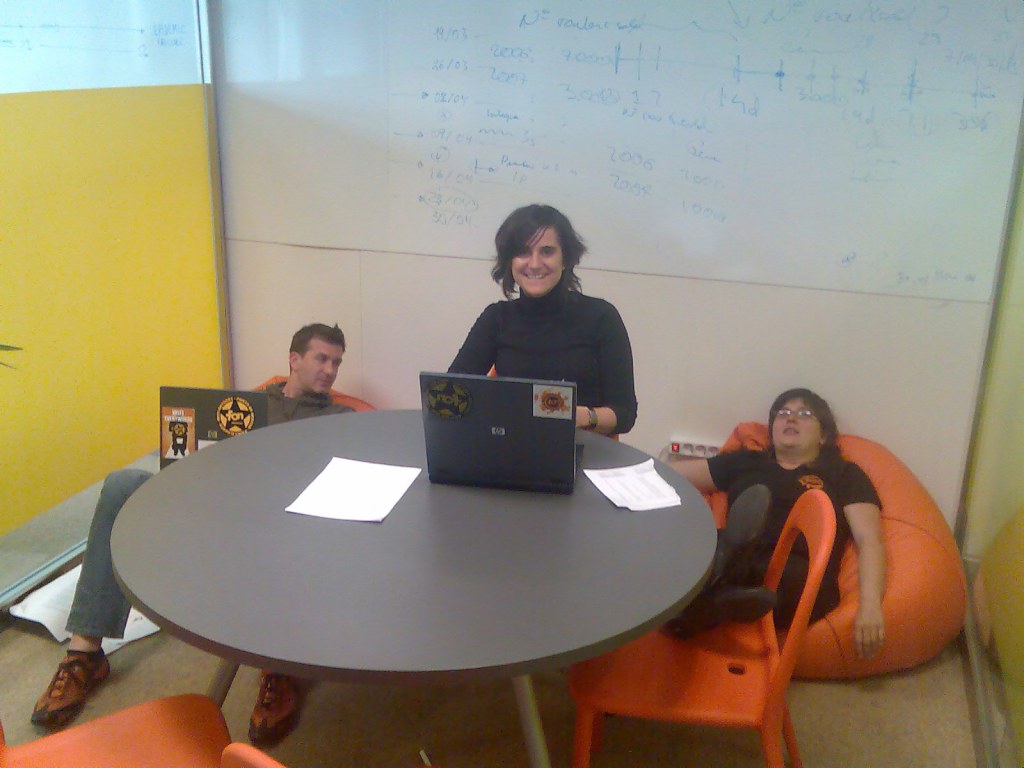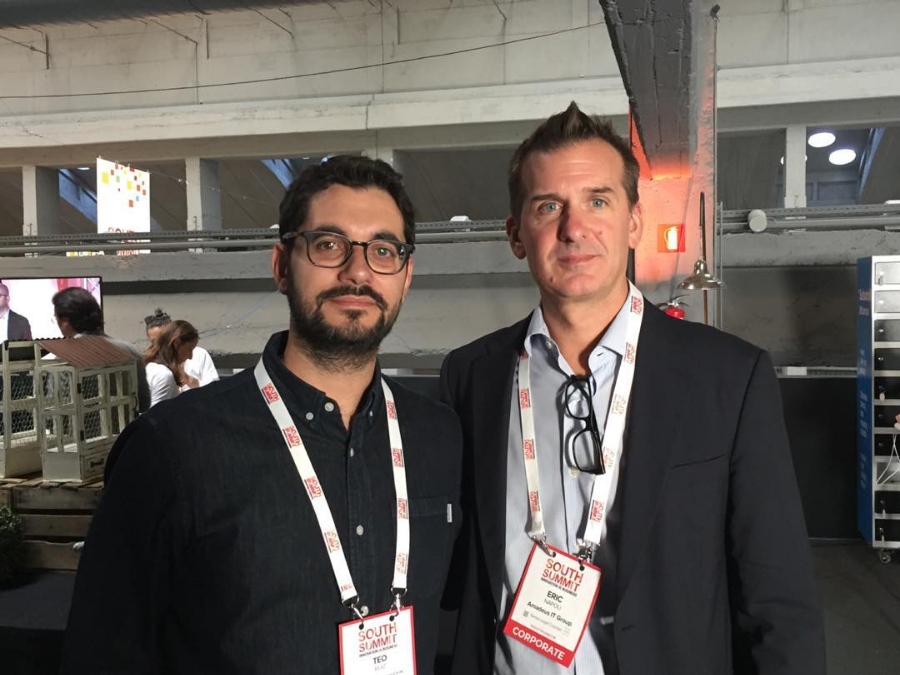
Last week when going through old files, I found this photo of a marketing campaign I had helped develop 15 years ago during my start-up days. In January 2006, I joined a tech start-up called FON. The company’s mission was to build a ubiquitous user-generated WiFi network where any user could connect to any other user’s WiFi signal when roaming. Share at home, roam for free. When I joined, I was employee number 6, the only lawyer on staff and the only native English speaker.
On my first day, right as I was leaving the office, the founder and CEO – who loved to test new employees by giving them some last minute arbitrary assignment – asked me to prepare an urgent presentation detailing a new product concept. When I finally got home around midnight, the red light on my first generation, newly issued Blackberry was flashing: “Attached draft agreement, first round of seed money. Send mark-up by START OF BUSINESS.” That was only part of week one. I often tell this story about those first days:
. . . the CEO and founder who had literally made hundreds of millions selling businesses he had founded, proposed a certain marketing campaign. I sent him a lengthy email with a very well-reasoned description of why his idea was misguided. He called me into his office and said, “Eric, I know you are very smart, but I didn’t hire you to tell me that my ideas are bad. Either you make them better, come up with a better idea, or don’t come back to work tomorrow.”
By the end of the month, we had secured around €20 million in financing from the likes of Google, Skype, Sequoia Capital, and Index Ventures. Thus started a wild and intense ride.
During that ride, as the lawyer and native English speaker, I became jokingly known as the palabrator, a play on words in Spanish and terminator. That meant I wrote everything. So on top of contracts, I wrote all copy. I prepared or signed off on all customer and partner facing presentations, marketing materials, newsletters and press releases. I wrote or edited FAQs, product descriptions, and spent countless hours trying to get all of our messaging right … not because any of this was technically a lawyer’s job, but because the words and their delivery had to be perfect.

Because our CEO and founder thought that business developers – definitely not lawyers — added value, I was expected to do business development as well. I traveled to customer meetings, I emceed events, and I coordinated the relationship between sales teams around the world. I even interviewed all candidates for open positions. It was a start-up after all, so no one had the luxury to say, “that’s not my job”.
Definitely one of the highlights was sitting with the marketing team, especially next to the designers who could turn any whim of mine into a great campaign. At one point we were running a pilot in Madrid’s LGBT neighbor Chueca and were handing out free routers to bars and restaurants. We wanted to convey the message that our technology allowed you to safely convert your home/business WiFi signal into a hotspot. As we brainstormed, we came up with the idea of handing out condoms with our logo and catchy slogans printed on the packaging (ie, comparing safe sex to WiFi sharing). Coming up with silly, juvenile one-liners was way too easy: “Have FON”, “Safe Connection” and a couple of other phrases I won’t repeat relating to hotspots and easily locating them.
Sometimes being a lawyer is more than just cutting and pasting phrases like:
- which consent shall not be unreasonably withheld,
- as otherwise agreed by the parties in writing, or
- to the extent permitted by law.
Yes, we draft and negotiate contracts, structure transactions, assess risk, give recommendations based on existing legislation, manage disputes, and all that other good stuff. But a huge part of being a lawyer is being your company’s advocate which means making it look good to the outside world and showing up at the party like you’re the big brother. Our weapon is words.
We used to joke that the first week on the job felt like a month, the first month a year and 6 months – if you lasted that long – a lifetime. And there were lots of casualties along the way. We even kept a running count of those who didn’t survive.
As I have written about agile teams, start-ups achieve end-to-end agility almost right away:

[A start-up] is a small team that inhabits the same open-space. When you want to talk to marketing, operations or to the product manager, you pull up a chair. When I worked for a start-up, we’d literally take our laptops and puffs to a quiet corner of the office. In fact, I happened to sit between two web designers. I would bug them all day long with my ridiculous ideas for new marketing campaigns. In a normal company, no one would have paid any attention to me. But in a start-up, nobody cared that I wasn’t Marketing. We all gave our input and were able to try out lots of ideas quickly until we got one right.
But start-ups can also lose that agility very quickly:
Imagine that start-up (or a new business unit) scaling up very quickly. Suddenly you have a product management team of ten people, three regional sales teams, and operations and R&D located at separate sites from the business-facing teams. Next thing you know, your business has become very siloed, communication is strained, messages are lost in translation and teams become tribal. We’ve all seen this happen. Sales doesn’t understand what it is peddling and R&D doesn’t understand what the customer needs. The support functions, like Legal, HR or Finance, become their own centralized tribe out of sync with actual customer and market needs, and what they have to offer is many times too late, out of context, or one size fits all.
When we peaked at around 150 people across three continents, we were already breaking off into tribes just as described above. This coincided with the 2008 Great Recession, and as our cash was evaporating, tensions flared amongst a once very tight-knit group. Some of my favorite people left and others stayed. I didn’t want to take sides, so I finally decided to exit and take my chances as a slasher working for multiple start-ups.
On my last day at the start-up, I wrote:
These have been the “best of times, the worst of times, the tale of two companies”, but overall they have been amazing! I have never had so much fun or enjoyed myself like this before working with a better group of people than I have at FON. It was all worth it!
I have had the great honor of working with such a wide variety of different people from different professions and different fields. I learned about everything from technological geekiness to designing webpages to building a company from the ground up. I also had the great fortune of working closely with our teams across Europe and Asia. But most of all, I had fun — fun with a young and dynamic group of people — and never had to wear a suit, tie, or shave. And we laughed and laughed and laughed the whole way through. When I look back at this time, I am sure that I will think of it as one of the best experiences of my life.
Eventually the slasher business was too unstable. I was a newlywed hoping to start a family, so I moved to an established multinational tech company, in an established legal department where I have been ever since. At first the contrasts were extreme. I left a room full of eclectic sales, marking, finance and ops people and a bunch of developers we called the Men in Black – where there was always someone kicking a ball in the hallway, on their laptop in the corner on a puff, or yelling on the phone with a Gallego accent. And I settled on a silent floor full of lawyers with their heads down quietly typing away. I went from being part of every strategic decision to a place where to make an impact, I had to start at the micro level, one deal at a time. Surprisingly I have really enjoyed and thrived being in a much larger organization, with its amazing pool of lawyers to learn from and a much larger network of business colleagues to build relationships with.
But when I read that post from my last day, and especially now as I revisit old photos and videos of that time (especially this one or this one with some many faces I haven’t seen in years), 10 million stories come to mind, and I feel the same bond with my colleagues as I did back then and still continue to think of them as teammates today.
That time definitely made me a better lawyer, a business partner, and colleague. In particular: I learned:
- Solutions only. You are not getting paid to say no.
- Be part of the conversation on all aspects of the business. You need to be in the (virtual) room to make an impact, and no one will invite you if you show up with the word “no”.
- Be a Big Brother to those around you. Not just as your client’s advocate but also as a mentor and coach to your younger colleagues.
- Understand the business. Understand the technology, but more importantly know the business rationale driving the technology. The business use case always precedes the technology, but “coming up with the idea” means nothing without the ability to execute.
- Get started, make things happen. Don’t wait for perfection. Get going.
- Do not isolate your work from your client’s work. It is all your work.
- Don’t talk law to business people. They will tune you out. Talk business. That is what they understand and what they care about. You can worry about the law when you get back to your desk. Listen to how everyone else talks, learn their language.
- Relationships and trust are everything, and they last longer than you do at any company. Remember we are ultimately emotionally committed to our colleagues not to our companies. It is why most engagement survey questions are geared towards whether an employee feels valued by and connected to their coworkers. But just as easily as camaraderie can be built, it can be lost. Think long term: once we are on the same team, we’ll always be teammates.

I always feel so much pride whenever I run into one of my old colleagues and I see how they have grown.
Most importantly, laugh on the job. I don’t mean party with your colleagues, I mean make work enjoyable. We spend too many hours of our lives at work or worrying about work. You have to make the effort to make it fun, especially when the work is tough, intense, and demanding. Life is too short not to enjoy your time with your colleagues. But the moment you start dreading waking up to go to work in the morning, it’s time to move on.